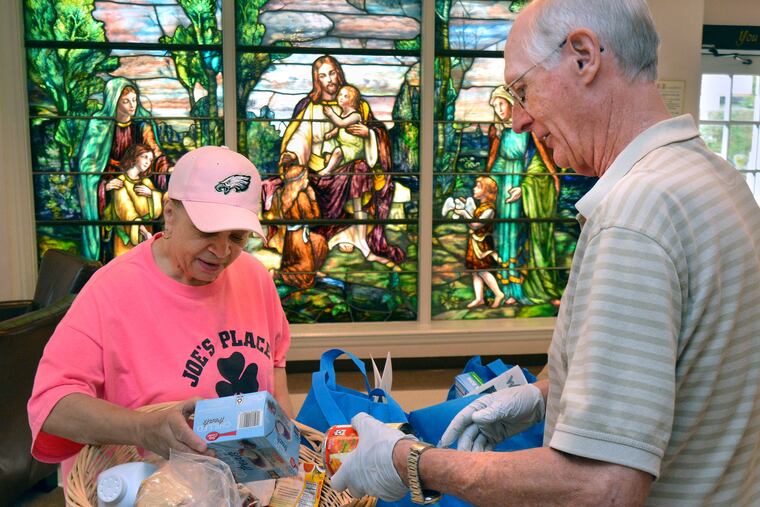Wayne food pantry nourishes low-income people in a rich place
“It’s difficult to be in need here,” said food pantry client Doreen Coleman. "Let's face it, there aren't any dollar stores in Wayne."

Two years ago, Doreen Coleman moved from Chester to a public housing unit in Wayne to raise her 16-year-old grandson after her daughter, who had relocated there years earlier, died of heart disease at age 35.
Dragging privation like scuffed luggage to a rich Main Line suburb hasn’t been easy. “It’s difficult to be in need here,” Coleman, 61, a widow and retired nurse’s aid, said while waiting at the Wayne Church food pantry the other day. “Let’s face it, there aren’t any dollar stores in Wayne."
The church, also known as Wayne United Methodist, houses what its officials say is the only food pantry in the town’s vicinity. In operation for about two decades, the pantry distributes roughly 15 tons of groceries a year, supplied by local food drives, donations from the congregation, and area businesses and organizations.
Incongruous as it may seem, hunger persists in this prosperous enclave of high-end restaurants and immoderately priced clothing boutiques, where the median household income is about $130,000 annually and the median home price tops $500,000.
That want can be a neighbor of wealth and comfort is no surprise to Pastor Tom Ebersole.
“People may be in a nicer setting, but when it comes to the individual in need, it’s the same struggle as in North Philadelphia," he said. "People come here with the same brokenness.”
Ebersole said there are 80 units of public housing on Highland Avenue, two blocks from the red-brick church with a tall, white spire that appears to connect the community to heaven. Some form of public or low-cost housing has existed on the Highland spot since at least the 1930s, local officials said.
These days, many of the residents there find help at the pantry.
“Their kids go to our schools," he continued. “We feed 25 to 30 families a week here, trying to make life a little better.”
‘Need our help’
Quite a few clients are older folks who no longer work and rely on meager pensions and Social Security to live, said pantry volunteer Bob King, a former engineer and executive at Sunoco. “They really need our help.”
For Coleman, a smiling woman with a gentle manner, Wayne may be pricey, but there are gratifying surprises.
“I thought the people here would be snobbish, because you don’t have, and they do,” she said. "But they’re nice, the police are helpful and caring, and the school’s support of my grandson has been overwhelming.
“I wasn’t expecting that.”
Still, Coleman said, she’s not yet accustomed to her greener environs. Coming from Chester’s gray grid of streets, where life is lived at sharp right angles, Coleman is unused to Wayne’s gently bending roads, which spiral and wind like flute solos.
“It’s hilly, curvy, and dark, and I won’t drive at night,” Coleman said. “I’m afraid of hitting deer.”
As Coleman left the pantry laden with bread, cereal, and soup, Zee Abed, 60, an unmarried former truck driver and one-time cook, walked in. Born in Egypt, Abed immigrated 35 years ago “for the big dream: America.”
Disabled by kidney cancer, diabetes, and nerve damage to a hand and foot, Abed said the Wayne pantry “is a big help for a low-income guy like me.”
Living in a well-off place can be a benefit, he said. “At least there’s safety here for an old man on medications. And you see nice people, nice cars, nice places."
But, Abed indicated, there’s a nose-pressed-against-the-glass sadness to knowing how to cook, yet being unable to taste a gourmet town’s flavors for lack of cash. “So I just take the tomato sauce from the pantry and try to make it last,” he said.
Adjusting to less
Adjusting to less is an exercise that Liz Siracusa, 59-year-old pantry client, is familiar with.
A housekeeper at a nursing home, Siracusa, who is unmarried, had her hours cut back not long ago. “I didn’t know how I’d survive,” she said, running her hand through dark hair. “I’m low-income."
Siracusa praised Ebersole’s church and its good works. “I get food here, and the pastor helps my spirit and soul,” she said, absent-mindedly crossing herself in the Methodist sanctuary like the born Catholic she is. “Excuse me,” she said, suddenly self-conscious.
Like other patrons of the pantry, Siracusa has contributed to a kind of diary that King keeps. Titled “Dear Food Pantry,” the journal is a compendium of hand-written observances by residents:
“I’m very grateful for the support and the helpful smiles.”
“We had our own business and lost everything. We really appreciate all you do.”
“I always feel respected.”
“It has filled my cupboard that was otherwise bare.”
“Sometimes I wouldn’t have food at all if it wasn’t for this pantry.”
Ultimately thankful to have access to the pantry amidst a culture of plenty, Siracusa shook her head in wonderment.
"You wouldn’t think we had need out here because it’s so Main Line-ish. But I feel the love here.
“Very sweet.”